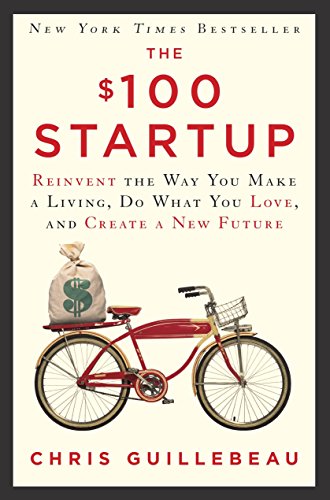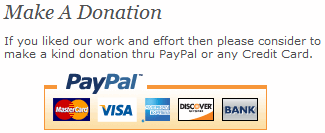The $100 Startup: Reinvent the Way You Make a Living, Do What You Love, and Create a New Future / Guillebeau, Chris
| List Price: | |
Our Price: $12.99 | |
|
For Bulk orders
| |
|
Used Book Price: | |
| The $100 Startup: Reinvent the Way You Make a Living, Do What You Love, and Create a New Future / Guillebeau, Chris | |
| Publisher: Currency | |
| Availability:In Stock. | |
| Sales Rank: 6276 | |
|
Similar Books
Q&A with Gretchen Rubin and Chris Guillebeau

 GR: One thing that really sets your book apart from other similar books is its specificity. You really drill down on how people have actually built these businesses. Why did you take this approach?
GR: One thing that really sets your book apart from other similar books is its specificity. You really drill down on how people have actually built these businesses. Why did you take this approach?CB: Because most books about business are too generic. They are filled with platitudes instead of data and real instructions. There's nothing wrong with saying “Go for it!”—but the purpose of this book is to say, “OK, you're ready to go for it? Great. Here's how you actually do it.”
This isn't a book about business, at least not as most people think about it. Instead, it's a book about freedom. It's for those who want to escape from corporate life, build something of their own to support their families, or just find a way to make more money.
GR: Is it really possible to make a good business out of your passion?
CB: Yes, but the key is to combine your passion with something that is useful to the world. I used to be very passionate about eating pizza and playing video games, but no one wanted to pay me to do it.
That's why we have to go further, until we find the convergence point between what we're excited about and what other people value. For example, I met a guy who was a snowboarding instructor in Canada. He created a DVD set of instructional videos. He followed his passion, he found a way to make it useful, and it's now a $300,000 a year business.
GR: Many books about startups focus on technology companies; by contrast, you focus on small businesses started by people creating companies around something they love to do. Often, they don’t look like typical “entrepreneurs,” don’t come from traditional business backgrounds, and don’t have special skills. Why did you take this approach?
CB: I think there's a real misconception about entrepreneurship. As you noted, some people hear the word startup and imagine things like venture capital, funding rounds, and eventually cashing out if possible. It's not that different from the conception of traditional business—wearing a suit, sitting behind a desk, playing golf after lunch.
But there's also an entirely different way of creating freedom, and it's just now starting to get the attention it deserves. This alternate perspective is about starting on your own, with limited money and no special training. You don't need outside investment (of any kind), an MBA, or a 65-page business plan that no one will ever read. You just need a product or service, a group of people willing to buy it, and a means of getting paid.
GR: The economy has a lot of people feeling anxious about their financial situations. Do you think this is a bad time to take a risk like a startup?
CB: When the economy causes us to feel anxious, it's also a good time to reassess the whole concept of risk. For many people, it may be much riskier to cast your lot in the traditional job market. But what if you didn't have to compete in a crowded marketplace—what if you could essentially create your own job? The beautiful thing about starting small means that you're not necessarily competing with anyone, and your financial risk is low.
In the long run, risk is related to security. Many of the people in this book were successful in creating their own security instead of entrusting it to someone else.
GR: You did a crazy amount of research for The $100 Startup. What surprised you the most?
CB: The first thing that surprised me was how willing most respondents were to talk about the inner workings of their business, especially the financial details. The common attitude was: if this helps other people in their work, I want to share it.
Digging deeper, I was surprised by some of the interesting businesses people had started. There is a guy who earns more than $100,000 a year helping people use their Frequent Flyer miles. There is another guy in Croatia known as “Mr. Spreadsheet,” who has also crafted a six-figure business helping corporate employees manage data better. There were also plenty of interesting businesses that were more traditional, like a retail yarn shop in Portland and an Israeli-American designer who created a business selling hand-made wedding contracts.
GR: You give some controversial advice: you don’t need a business plan, you don’t need to spend too much time planning, you don’t need a large amount of money to launch, and you don’t need special skills or expertise. What do you say to people who disagree?
CB: I'd say the proof is found in everyone who has made it happen. My hope is that this book will serve as a blueprint for many more success stories, just like the unconventional and unexpected entrepreneurs I talked to from all over the world.
Now you can buy Books online in USA,UK, India and more than 100 countries.
*Terms and Conditions apply
Disclaimer: All product data on this page belongs to
 .
.No guarantees are made as to accuracy of prices and information.










